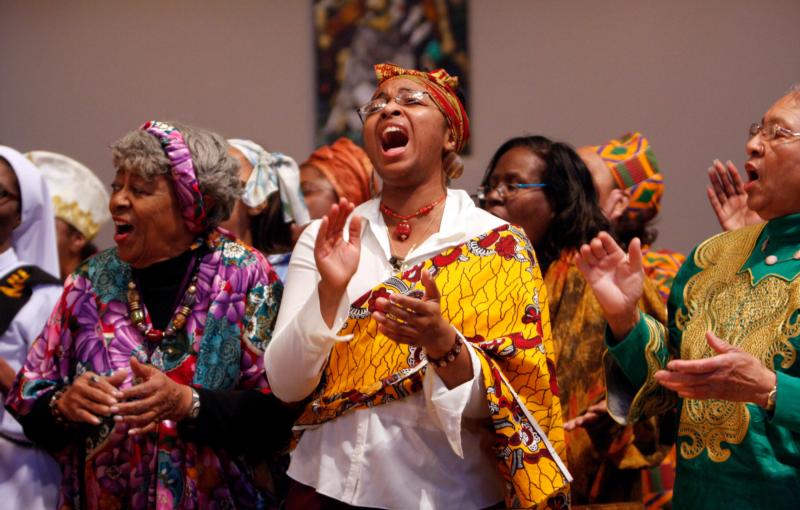
Members of the Sister Thea Bowman Diocese of Rockville Centre Gospel Choir sing during a special Mass in 2009 at St. Agnes Cathedral in Rockville Centre, N.Y. While preaching at Mass is reserved to the priest or the deacon, music is something in which everyone can play an active role. (CNS photo/Gregory A. Shemitz, Long Island Catholic)
As a musician preparing to enter the Order of Preachers, I was encouraged by a wise old priest who said that he thought preaching and music were the two things that needed the most improvement in the church.
While preaching at Mass is reserved to the priest or the deacon, music is something in which we all can play an active role. So, what exactly can we do to improve our musical situation?
(See a related video.)
First, we must realize the importance of music at church. The Second Vatican Council’s 1963 Constitution on the Sacred Liturgy, “Sacrosanctum Concilium,” states that “the musical tradition of the universal church is a treasure of inestimable value, greater even than that of any other art” (No. 112).
St. Augustine and St. Thomas Aquinas, two of the church’s greatest theologians, encourage the use of singing in church so that the souls of the fainthearted may be moved to grow in their devotion to God.
Second, based on that importance, we should ensure the training of our musical leaders.
[hotblock]
If the priest who preaches is given two years of philosophical training and four years of theological training, including special attention to preaching and to the celebration of Mass, doesn’t it seem a bit strange for us to think that anyone, regardless of training, can lead the music at Mass, music that often occupies a greater amount of time of our experience of Sunday Mass than does preaching?
A music director at a Catholic church should be skilled as a singer, a conductor and an organist and should also be formed in the church’s musical tradition.
In many churches, music simply doesn’t receive the attention or funding it ought to have. Where possible, a church should find some way to employ its music director full time.
And where possible, a church should also have a pipe organ (or at least a high quality electronic organ), which “adds a wonderful splendor to the church’s ceremonies and powerfully lifts up man’s mind to God and to higher things,” as well as providing firm support for the singing of an entire congregation (No. 120).
These things can require a significant investment, especially in smaller churches, but as Mother Teresa would remind us, it is not a waste to do something beautiful for God.
Any Catholic worshiper can express support for music and gently and charitably suggest that it receive more attention and funding, and even offer to provide financial support for music if possible. Pastors often hear plenty about what people don’t find helpful, so it’s good to let them know what you do find helpful and are willing to support.
Third, we should consider what music is sung in church.
The council first promotes the “treasure of sacred music,” of which it gives two particular examples: Gregorian chant, which should have principal place, and other kinds of sacred music, including polyphony (No. 114). And yet, in many of our churches, music that was written before the time of the council is rarely heard.
Incorporating more of this music will connect our worship with that of Christians throughout time and space. Many Latin and English chant resources, designed for various groups and levels of ability, are available in both print and online resources, allowing us to sing and hear these texts that are inherent to the liturgy.
The council, though, also encourages composers to add to the treasure of sacred music.
Because this kind of music is what we most frequently hear at Mass, it is helpful to ask whether the music sung in your church best satisfies two further directions the council gives about new music: first, that it should have the qualities proper to genuine sacred music (sanctity, goodness of form and universality), and second, that the text should be in conformity with Catholic doctrine and drawn chiefly from holy Scripture and from liturgical sources.
[tower]
Tell your musicians and your pastor about your support for both the beautiful music of the tradition and the best of newly composed liturgical music. Be particular in your examples.
If you have questions or concerns about a text that you are singing at Mass, ask your pastor or someone else who knows the faith well. Allow what you sing at Mass to make you more devoted to God. Foster religious singing, too, in the home and in other social gatherings.
Finally, we should support choral and congregational singing, both of which the church heartily encourages.
If you think you might be able to contribute as a singer or as an organist, you should speak to your music director at your earliest opportunity. If musical performance is not one of your particular gifts, ask what you can do to support your musicians, and make sure that you sing as part of the congregation.
Good music, even if it’s simple, is possible at any church.
Let’s give it the attention and funding it deserves, sing the most beautiful music we are capable of, and then allow both choirs and all of the faithful to worship God not only with the spoken word but with the word of praise clothed in the beautiful music that is both God’s gift to us and our gift, in return, to him.
***
Father Vincent Ferrer Bagan is a Dominican friar of the Province of St. Joseph. He has worked as a school music teacher and church music director and presently teaches theology and music at Providence College in Rhode Island.
PREVIOUS: Music ministers advise how to get the congregation singing
NEXT: Hitting the right notes with music at Mass



Share this story